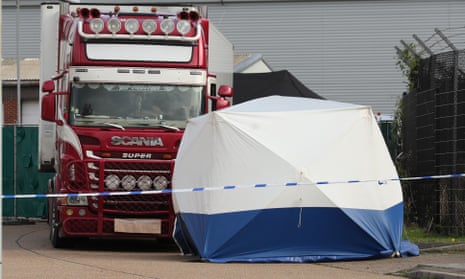What leads someone down the route where they find themselves locked into the back of a lorry, a beating heart in a metal box? What choices – or lack of them – have led someone to be reduced to a piece of human cargo? Can anyone who read the story of the 39 bodies found in the back of a lorry last week not feel the visceral terror of that cold, dark death and wonder at how we live in a world where a business model exists that thrives off this level of human desperation?
At the moment it is unclear whether this tragedy is the work of smuggling gangs – who are in a transactional arrangement with the people they are moving from place to place – or human traffickers, who are exploiting and profiting from their human cargo. In the end, does it even matter? Both are looking to profit from the very human desire to not only survive but to thrive. Across the world, trafficking and smuggling gangs are flogging promises and dreams and then using fear – of pain, of the authorities, of their debts, of their failure – to make vast amounts of money in the knowledge that they’re unlikely to get caught, and in the certainty that their victims are expendable.
One Vietnamese teenager I interviewed last year had, like last week’s victims, crossed the Channel in the back of a lorry. He described the experience to me: the pain of the jolting metal that tore into his skin; the stench of other silent bodies he was pressed up against; the poisonous diesel fumes; and the hunger and thirst that gnawed at his insides.
His journey towards that point had begun with a childhood of crippling and monotonous poverty and the belief that the only way to escape and honour his filial responsibility to provide for his parents was to follow the promise of work in the UK. He embarked on an overland journey across Europe where he was smuggled from safe house to safe house, fell under the control of criminal gangs and was raped, beaten and brutalised. By the time he reached France, he was told he had to pay back £20,000 – an amount he couldn’t even comprehend. His parents would be the ones who would suffer if he didn’t pay them back.
By his point his life was not in his hands. A chain of events had been set in motion that he had no control over. There was no way back: his only future was one where his sole reason for survival was to pay off his debts. He ended up being trafficked into a cannabis farm in Derbyshire.
In the eyes of the law there is a distinction between illegal work and modern slavery – with the former you are a criminal, and the latter a victim – but in reality the line is not so clearly defined. Many who are here to work move between the two. Across the UK, thousands end up being exploited and unpaid in our restaurants, car washes, agricultural fields, care homes, hotels and nail bars – visible but unseen.
Official statistics say up to 15,000 people are trapped in a form of modern slavery in the UK – although those working on the frontline believe this figure to be a huge underestimate. Our government says that with the 2015 Modern Slavery Act it is a global leader in cracking down on this practice, yet prosecutions remain low. In 2017-18 there were only 185 convictions for slavery and trafficking crimes – a fraction of the cases reported to the authorities.
Crucially, prosecutions require victims to come forward and testify. Yet their immigration status is often considered more of a priority than their exploitation. Traffickers tell their victims if they go to the police they will be arrested and detained, and more often than not they’re right. Recent research found over 500 victims of trafficking were arrested and sent to immigration detention centres last year. Even though police guidance tells officers how to identify cases of modern slavery, Vietnamese children found in nail bars or cannabis farms are still routinely arrested, charged and detained.
Even those who are recognised as victims of trafficking by the authorities are in for a rough ride. The government’s national referral mechanism, the framework for identifying and protecting victims of slavery, is sometimes considered by victims to be as traumatising as their trafficking. They can find themselves trapped in a legal limbo in a complex and under-resourced system for years at a time. And in the end victims are probably going to be removed back to the country where they were trafficked: according to the government’s own figures only 12% of victims of slavery are granted discretionary leave to remain.
All of this matters because it creates an environment in which the business of exploiting the desperation of human beings can thrive. Where the gangs know that British people will pay £8 in cash for a pedicure, or to get our car hand washed, without thinking too much about why. It’s a business model where people can be exploited for profit over and over again with the near certainty that in the end it will be the victim who the system comes down upon, for making the journey in the first place.
In 2004 the death of 23 Chinese cockle pickers in Morecambe Bay was a moment of reckoning – a human tragedy that, for many people, raised the spectre of modern slavery in the UK for the first time. Today, 15 years later, maybe these 39 deaths might do the same and remind us that our only chance of beating the business in flogging human lives is to try to understand how people come to be locked inside the backs of lorries in the first place.
